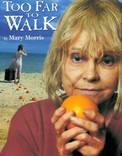Too Far To Walk
"Too Far to Run" is part fact and part fiction. The author Mary Morris came up with the idea for the story when she read in a West Australian newspaper about Clarissa Scott, who, as a child had been incarcerated in a mental home in northern England in the forties simply because there was no place for her in a children's home. Whilst there, she had been neglected, uneducated and forgotten, and her claims that she had an elder sister, Olive, were dismissed. Fifty years later she gains her freedom and finally reunites with her sister who is now living in Australia. Morris uses this tragic event as fertiliser for her creative imagination and pens a poignant and perceptive play.
The plot entwines around the present and the past. In the present are the two elderly women, Clarissa and Olive, who both carry the scars of their childhood with them, memories that continue to maim them even in their old age. We dip from the present into their past as slowly the memories which these woman are burdened by are acted out by two young girls. In this way we can see how the relationship between the two elderly sisters are shaped by their past abuse. When the brutal truth of why Clarissa was left in the mental institution is revealed, the two elderly women touch their two younger selves for the first time. At last they have come to terms with their past and have discovered some peace in their shared grief. The two women are no longer imprisoned by past.
The delightful Prunella Scales plays the elderly Clarissa, who is insistent on being reunited with her sister. Clarissa has lots of unanswered questions the most important of which is 'Why was she left in a mental home?' Prunella Scales portrays the resilience of her character and despite her character's lack of education and terrible years of neglect still managers to portray her insightful and fearless nature. She carries her anguish visibly on her face and yet expresses the warmth and sympathy that only a person who has suffered terribly knows how to offer.
Susan Harrison plays the young Clarissa, the child who is placed into care. She speaks and acts with the tenacity of a strong willed child trying to understand the cruel, and at times vicious actions of the adults around her. She perfectly captures the bemusement, anger and anguish of a frightened little girl.
Gillian Axtell who plays the elder sister Olive and Annie Rowe the younger Olive both give good performances and each, in their own way, add to the pungency of this production.
In the programme notes Mary Morris says that the idea of her writing seemed a 'preposterous dream'. What would have been preposterous was if her creative talent had never seen the light of day because of her perceived lack of confidence. Morris has a skill to focus on the essential points of a story and of its characters; even the apparent minor incidents she portrays reveal hidden depths. No melodramatic gestures, no prolixity in her dialogues, just the keen eye of a thoughtful observer and this wonderful ability that she has is displayed to its fullness in this simple but thought provoking story.
In "Too Far to Walk" we are led into a world of neglect, child abuse and guilt, not to be chilled by the grief and misery caused by such terrible acts, but to be warmed by the nobility and sagacity of its victims. This is one fringe production that must be seen and which is most deserving of a West End run.
(Alan Bird)
Email : alan@londontheatre.co.uk
Originally published on
